- Home
- Belva Plain
Heartwood Page 10
Heartwood Read online
Page 10
Her company, which was simply named Laura’s Catering, had been a success almost from the beginning. As she’d predicted, she’d started turning a small profit in the first six months, and by the time she’d been open for two-and-a-half years, she was doing well enough to pay her brother back and next year she’d be giving him a return on his investment. (Phil said he was going to set up a college fund for Katie with the money.) It seemed that in addition to Laura’s domestic skills, she had a head for business.
Of course, she had made mistakes. In the beginning, she’d been thinking as if she were still in California and she hadn’t grasped the full difference between a busy suburb on the outskirts of the world’s biggest city and a sleepy little college town. She’d tried giving out free samples of her wares in the local mall, and it had taken her several weekends to realize that this was not the way to break into a market that moved at lightning speed and was crowded with products and services vying for the consumer’s attention. On Phil’s advice she had gritted her teeth and spent some of her precious capital to hire an advertising agency. But once they managed to get the word out, Laura’s Catering had taken off. She’d been right about the busy workingwomen who needed a wife.
–—
“Mom, did you see that?” Katie had stopped again. She pointed to a store window they had just passed. The words “Hospital Services Thrift Shop” were painted across the window in big black letters, and in slightly smaller print was the information that all items in the store were donated and the proceeds of sales would benefit two hospitals that were located in the area.
“What is it?”
“There’s a picture in that window. It’s really weird.” Katie grabbed her hand, and pulled her toward the shop. “Come on.”
They didn’t have time to look at weird pictures, if they were going to catch the train back to Westchester. Laura and Katie had come into the city so Katie could attend her cousin Rebecca Ruth’s birthday—the two little girls really didn’t like each other much, but family was family—and Laura still had work to do when she got home. But she had already been reprimanded once by her daughter today.
“Okay, show me your weird picture,” she said.
–—
It was an oil painting with an ornate gilt frame, and it had been placed in the center of the somewhat jumbled window display so that it dominated the space. It was a portrait of a woman. She was dressed in the style of the early part of the century in a cream-colored gown with ruffled lace trim, and a long string of pearls falling over the lace. But it was the woman’s face that made Laura gasp out loud. She would have known those huge dark eyes, that high narrow nose, that mouth and that hairline anywhere.
“See Mom?” Katie demanded. “Why do they have a picture of Grandma Iris in this window?”
Chapter Thirteen
The woman in the portrait couldn’t be Iris. Obviously not. And yet … those distinctive dark eyes … and that mouth … and that nose …
“It has to be Grandma,” Katie said at Laura’s side. “She’s not one of those people who look like lots of other people. She’s special. So it has to be her.”
“It certainly does look like her … very much … but it can’t be, Katie …”
“Let’s go inside and ask about it.”
Laura glanced at her watch. Tomorrow morning she had to deliver seven breakfast baskets to a new inn that had just started using her services. If she missed the train she would have to work late that night to make up the time. But the portrait did look so much like Iris … She took Katie’s hand.
“Come on,” she said, and they went inside the shop.
–—
“Yes, isn’t that picture fabulous?” said the gray-haired woman who was tending the shop. She was wearing a name tag that said VOLUNTEER in red letters. “I’m afraid I don’t know much about it. The man who manages this store knows the history of all of our donations, but you just missed him.”
She lifted the portrait out of the window and propped it on a table so Laura and Katie could see it better. Iris’s face—well, not Iris’s face but the face of someone close enough to be her double—stared out at the dusty shop with a remote, haughty expression.
That isn’t like Mom, at least. Mom never looked haughty a day in her life.
Still, the resemblance was eerie. Laura was starting to wish they hadn’t come into the store—the picture was making her uncomfortable.
“I don’t think the artist was anyone famous,” the woman went on. “I’m sure he wasn’t, because we would have saved this for our fine arts auction at the end of the year if he was. But I can tell you who donated it.”
“That’s okay,” Laura started to say, but the woman was already bustling around the counter.
She pulled out a large black notebook. “All right, here we are,” she said after a couple of seconds. “Oh, this is interesting. The donor was a woman named Leah Sherman; she used to own a boutique right here on Madison Avenue. It was a very elegant place. She sold real European couture, the kind of thing you don’t see anymore.” The woman smiled at Laura. “I remember it because my mother bought my first grown-up gown there. The store was called Lea, or something …”
“Chez Lea,” Laura said, and now the uncomfortable feeling turned into a shiver. “My mother used to shop there. And so did my grandmother.”
“What a coincidence. Although, perhaps it isn’t. Most fashionable women who lived around New York did shop at Chez Lea back in the day.”
“I guess,” Laura said, only half listening. She was staring at the portrait again; now she didn’t seem to be able to take her eyes off it.
“Mom, could we buy it?” Katie broke into her thoughts. “It’s for sale, isn’t it?” she asked the saleswoman.
“Yes, I can look up the price for you.”
“We could give it to Grandma,” Katie said. “I bet she’d like to see it.”
A shadowy memory came back to Laura: she was in her teens and she and her mother were spending a Saturday together, when out of the blue, Iris had said, “When I was a child I always felt like an outsider.”
At the time, Laura hadn’t really thought about it. Her shy mother had always been resentful of her own beautiful and charming mother, and this had seemed like one more complaint about her childhood. But now, as Laura looked at the portrait in front of her and remembered her mother’s words, she decided for reasons she couldn’t begin to articulate that her mother wouldn’t want to see this painting of the woman whose dark eyes looked so much like her own. And furthermore, Laura didn’t want to show it to her.
“We can’t carry that thing around the city, Katie,” she said. “The frame is so old, I’m sure it would chip.” She turned to the saleswoman. “I’m sorry,” she said.
“Well, perhaps I could interest you in something else. We have a couple of lovely watercolor sketches …”
“Not today, I’m afraid.”
“Would you like to sign our guest book? We can put you on our mailing list.”
It was the last thing Laura wanted to do, but the woman was clearly disappointed at not having made a sale. Laura signed the book.
“Now, are you absolutely sure—” the woman began, but Laura cut her off.
“I’m afraid we have to run,” she said. She opened the shop door quickly, and ushered Katie through it. “Good luck selling that painting,” she said over her shoulder to the saleswoman.
–—
Theo hadn’t gone to Rebecca Ruth’s birthday party in Manhattan. He’d been planning to, but at the last moment, he’d felt a little tired so Iris had gone without him. Now he was sitting on the front porch—something he had never done before he got sick, certainly not in the middle of the day—watching three little girls play hopscotch on the sidewalk in front of him, and letting his thoughts wander where they would. As they did so often these days, they went to his late mother-in-law, Anna. And Anna’s secret that she had carried to her grave—the secret that Theo would now carry to h
is. He had sworn he would never reveal it, and he wasn’t a man to break his word. But he was finding that knowing it was a bigger burden than he’d thought it would be. He hadn’t felt that way when he’d first learned about it, but perhaps your perspective on such things changed when you’d had a close brush with your own mortality.
He wasn’t angry or resentful about knowing what he knew, he wasn’t one to waste his time with that kind of mental whining. But he did wish he was still like the rest of Anna’s family and was blissfully in the dark about one of the most important facts of her life. As he sat in the sunshine listening to the laughter of the three little girls playing the old-fashioned game, and waited for his wife to return home, he found himself wishing for ignorance.
–—
Laura and Katie had missed the train from the city so Laura had gotten behind on her work, as she’d predicted. That was why it was one o’clock in the morning when Robby woke up, realized that she had not yet come to bed and finally found her in the ballroom.
“What are you doing?” he asked as he rubbed the sleep out of his eyes.
“The sweet rolls for tomorrow’s breakfasts are baking, so I thought I’d come in here and get started on sanding this woodwork.”
“My wife, the superwoman.”
Robby was looking better than he had when they were in California. The puffiness around his jawline had vanished, and his slim waist was back. But Katie had said he didn’t like working at the museum …
Are you happy, Robby? Is our fresh start working out for you? she wanted to ask. But she wouldn’t because she was too afraid. Because if he wasn’t happy, she didn’t know what to do about it. And she didn’t want to feel guilty about him. She knew that was selfish, but she couldn’t help it. Everything was going so well for her; she loved her house and she was excited about her business, and she didn’t care if it was one o’clock in the morning and she was still baking rolls and sanding woodwork. I’m too happy to be tired, Robby. And I hope you’re happy too.
“I’d offer to help you,” Robby interrupted her thoughts. “But we both know what happened the last time I tried to strip the wallpaper.”
“That steamer is tricky,” she said lightly.
“And I’m not handy.”
“Not everyone can be a good janitor. You’re the brains of this outfit.”
I hate it when I do that—when I put myself down in that way. But I’m trying to make you feel strong by making myself less than you. And then it bothers me when you smile, like you are right now.
“Would you like me to make you some tea or a cup of hot chocolate?” she asked.
“No, thank you. You may be able to stay up all night, but I’m a mere mortal. I’m going back to bed.” He headed for the door, then suddenly he turned back. “Laura?” he said. “Don’t ever think that I don’t know how remarkable you are.”
She felt like she’d been found out in a lie. “I’m not—”
“Don’t, all right? Give me credit for knowing what’s in front of me.”
“Well then … thank you.”
The trouble was, she didn’t know if he liked it that she was remarkable. He was getting harder and harder to read.
“Everything you do, you make it look so easy,” he went on.
“Well, most things I do are easy. Making a slipcover or baking a cake isn’t exactly brain surgery.”
“The great Laura McAllister can-do spirit.” He laughed. But he wasn’t looking at her so she couldn’t see if the laughter had spread to his eyes. “Someone should write a story about you. Maybe you should write it. Call the newspaper here. They have a woman’s page.”
“I couldn’t call the newspaper and brag about myself. Besides, no one would be interested in me.”
“With that can-do spirit? You’re the damn American Dream, Laura. You’re the Girl Scout who grew up to rule the world and the Little Train That Could all rolled into one!” He laughed again, and again she couldn’t see his eyes. “Don’t sell yourself short. Get the publicity. You’ll sell hundreds of breakfast baskets.”
“I don’t know.”
“The interest will be there. Because you’re one of those people who never fails. Everyone likes to read about a winner.” He yawned. “And now, I’m going to bed.”
After he left, she still felt she didn’t know how he felt about anything—not the house or his job, or their life. Or her.
If I had a perfect marriage I wouldn’t have to wonder what he’s feeling. I’d know because we’d talk to each other. But I’m not sure I know what a perfect marriage is anymore. And sometimes I think the less you say, the better.
She went back to sanding the woodwork. After a few minutes, Molly wandered in to join her. She settled the dog, whose joints were starting to get arthritic, on a pile of old sheets. “It’s just you and me, girl,” she said, and went back to work.
Chapter Fourteen
The suggestion Robby had made stuck with her. A story in the local newspaper would be a boost for her business. And, even though it embarrassed her to admit it, she thought it would be fun to see her name in print. Nana’s granddaughter had an ego, it seemed. And what would Nana have said about that? She had always been so careful to keep herself in the background and let her husband shine.
I tried that and it didn’t work, Nana.
Still, Laura tried to find ways to make it up to Robby. She made special dinners, with candlelight and wine. But by the time she’d put Katie to bed and walked Molly, it was usually too late for them to enjoy sitting down and eating a leisurely meal. Besides, Robby said sometimes her gourmet food was a little too rich for him.
So she told him she agreed with him that something must finally be done about their disgraceful bedroom. Robby swore that he would paint, hammer, and saw, if they could just please get rid of the ghastly wallpaper, and they both laughed. But it didn’t take long for Robby to get bored.
“God, we’ve been sanding this floor for weeks,” he said.
“Only a couple of days.”
“Well, it feels like it’s been longer. Can’t we hire someone to finish it?”
“Finishing it ourselves is supposed to be what makes it so satisfying.”
“For you, maybe. But I have better things to do.”
Unfortunately, whatever those better things were, they didn’t include his work at the museum.
“I’ll tell you the truth, Laura,” Steve said during a visit to New York, “Leland is disappointed in Robby. He was expecting him to be much more aggressive about getting attention for the museum.”
So Katie had been right, Robby didn’t like working at the museum. And being Robby, he wasn’t putting any effort into the job. The job that had been handed to him on a silver platter, after he’d ruined his career by being stubborn and immature. But a loving wife didn’t let anyone—not even her older brother—know that she thought her husband was being stubborn and immature. A loving wife defended her husband no matter what.
“I’m sure Robby is doing everything he can to build the museum’s reputation. These things take time …”
“He’s been there for three years, and he hasn’t held one major exhibit. There was an offer of an exchange with a museum in Massachusetts that he never bothered to answer.”
“The job he has is so loosely structured. Maybe he doesn’t know what’s expected of him.”
“Well, that won’t be a problem anymore. Since he doesn’t seem to be able to take initiative on his own, Leland’s appointing a board of directors that will be doing regular oversight. They’ll keep it low key for now, no one wants to insult him because he’s my brother-in-law, but he’s going to have goals he has to reach.”
Laura braced herself for the explosion when Robby heard the news. But he never mentioned it—and neither did she. By that time she was busier than she’d been before, because one of the inns that had been buying her breakfast baskets had called to ask if she could cater an event for them—a cocktail party that would benefit an arts prog
ram for low-income kids.
“And of course you said yes,” Robby said when she told him about it.
“Look at it this way: now I won’t have time to finish sanding the bedroom floor, so you can hire someone after all.”
“Ah, the perks that come from having a successful wife.”
–—
Overnight, Laura was plunged into a whole new world. She had to hold a tasting for the charity’s planning committee so they could decide on the appetizers. She had to hire waiters and bartenders, and she had to rent tables and chairs and a tent. She had to buy tablecloths and napkins, and baskets for her signature homegrown flower centerpieces. She had to figure out the cost per head for the guests.
“Are you sure you want to take on something as elaborate as this?” her mother asked. It was Sunday afternoon, and Katie and Laura had had lunch with Iris and Theo. This was a weekly ritual Laura had begun after Katie arrived in New York. She wanted her child to have as much time with her parents as possible. Especially Theo—for reasons she didn’t want to admit, even to herself. While his recovery after the heart attack had been satisfactory—that was what the doctors said—he certainly wasn’t a healthy man. In addition to the medicine he carried at all times, there was now an oxygen tank discreetly tucked away in the new first-floor bedroom. He hated using it and tried not to when his children and grandchildren were around, but the fact that he needed it was a new development. Iris avoided talking about it, probably in deference to his wishes, but Laura had noticed that whenever Theo had a setback with his health, her mother seemed to become more worried about the health of Laura’s marriage. Now she repeated, “Are you sure about this job?”
“I have to try it. It’s only cocktails and hors d’oeuvres, not a full meal. It’s a bigger job than I’ve ever done before, but as parties go, it’s relatively simple, so it’s a good way to start expanding my business.”
Iris picked up a plate and began rinsing it carefully. “Don’t you and Robby make a good enough living now? Why do you have to expand?”

 The Golden Cup
The Golden Cup Her Father's House
Her Father's House Whispers
Whispers Crescent City
Crescent City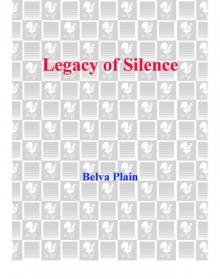 Legacy of Silence
Legacy of Silence Crossroads
Crossroads Promises
Promises After the Fire
After the Fire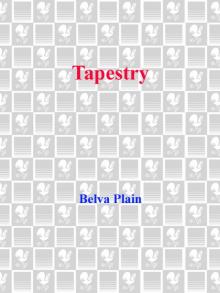 Tapestry
Tapestry Looking Back
Looking Back Heartwood
Heartwood The Carousel
The Carousel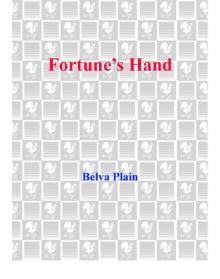 Fortune's Hand
Fortune's Hand Homecoming
Homecoming Random Winds
Random Winds Harvest
Harvest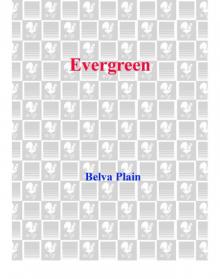 Evergreen
Evergreen Treasures
Treasures The Sight of the Stars
The Sight of the Stars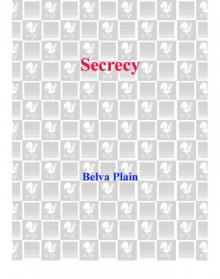 Secrecy
Secrecy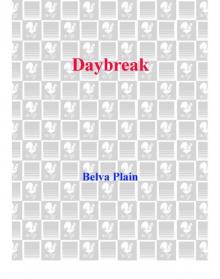 Daybreak
Daybreak Eden Burning
Eden Burning